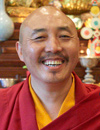
We will only ever get what we want through concern for others. As long as we remain limited to concern for ourselves we will never, ever, get what we want. This is why it is said that buddhas depend upon sentient beings just as much as sentient beings depend upon buddhas.
Buddhas can only become buddhas through cultivating compassion for sentient beings. Sentient beings must be the focus of any buddha’s cultivation of awakening. No one can achieve buddhahood through wanting buddhahood for their own sake. You can only achieve buddhahood if the only reason you want buddhahood is to be able to help others. Therefore, buddhas are dependent upon sentient beings. Sentient beings are dependent upon buddhas, as it is buddhas who teach us, sentient beings, how to become buddhas, which is the only way we can get what we want. In that way, buddhas and sentient beings are interdependent. The only difference in the starting point is that buddhas become buddhas through benevolence, and sentient beings remain sentient beings, and don’t become buddhas, through selfishness.
Deep down, on a very deep level within our minds, each and every one of us knows all this to be true. Whatever we may think, whatever we may believe, and no matter how jaded we may have become through our actions, we still feel it when we harm someone else. That feeling never actually goes away. If you perform an ill deed that harms others, no matter who you are, you may conceal it from others, but you will regret it. For example, a single harsh word spoken to another person will be remembered by you for days and days afterwards, in the middle of the night. And no matter how jaded you may be, you will still feel a warmth of satisfaction with every good thing you do. And you will remember, at moments, every kind word you have spoken to another person.
[From a teaching on Bodhichitta by Lama Tashi Togyal given in Battle Creek, Michigan, in November 2013. Translated by Lama Yeshe Gyamtso. Edited by Matt Willis. All rights reserved. Complete teaching available at Kunzang Palchen Ling’s website as a free audio download.]
